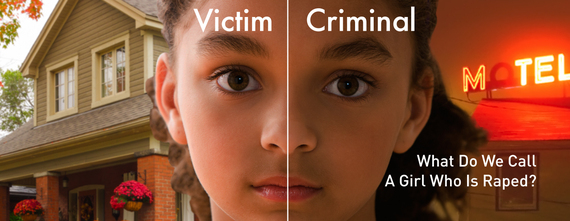Co-authored by Withelma "T" Ortiz Walker Pettigrew, Survivor Advocate and Policy Consultant
Every day, children all across the United States are bought and sold for sex. More than half of these children are girls and many, if not, most of them come from the foster care system. Despite not even being old enough to consent to sex - and despite the existence of federal law that defines them as victims of human trafficking, each year more than 1,000 American children are arrested for prostitution in the U.S.
But it is not only our legal system that treats abused and exploited children as child prostitutes. According to our research, there have been more than 5,000 instances in the past several years where media outlets have used the term "child prostitute" or similar terms like "child sex worker" to describe minors trafficked for sex.
Language matters. The message we send to young survivors when we continue to call them "prostitutes" and deny their victimization is that we don't care about their truth and pain, or worse, that they are somehow complicit in their own victimization. And that is precisely why we at Rights4Girls launched the No Such Thing campaign last year-- to erase the notion of "child prostitute" in both language and law and to ensure that survivors of child sex trafficking are accurately portrayed in the media.
Today, we learned that the Associated Press heard the call from the over 150,000 people who signed our Change.org petition, penned by Survivor Advocate Withelma "T" Ortiz Walker Pettigrew, urging the organization to cease using the phrase. We are thrilled that The Associated Press revised its AP Stylebook to now instruct writers to avoid using the word "prostitute" when a child is involved.
We've always known there's no such thing as a child prostitute and now, thanks to the Associated Press, millions more Americans will know that too.
The Associated Press's decision to end the use of the phrase "child prostitute" is not only a win for accuracy in reporting, but it will go a long way toward changing attitudes about girls who are victims of child sex trafficking. These children are victims of child rape, and they should be treated as such.
The Associated Press's decision sends a strong message to the thousands of news outlets across the country that continue to use the phrase "child prostitute." It's time for them to make this change too.
We also need law enforcement to follow the lead of the news media and stop arresting underage girls for "child prostitution," and instead get them the care and support that they need. Los Angeles County became the first law enforcement agency in the country to declare that there is No Such Thing as a "child prostitute" and we need more agencies to follow their lead.
Through No Such Thing, we're working with states and counties to end the practice of arresting and detaining victims of child sex trafficking and working to educate policymakers and the public on the need for reforms to reflect that these children are victims, not criminals. Although we have successfully changed the language, our campaign and our work will not stop until the laws are changed across the nation. The simple fact is that if children cannot consent to sex, then there is no possible way that they can consent to sell sex.

